Places Visited: Traveling I-10 from Pensacola, Florida to Lafayette,
Louisiana.
Louisiana: Baton Rouge, Lafayette, Beaux Bridge
April
5, 6 & 7 2007.
After an extended stay in Pensacola we headed out for
the summer on Thursday the 5th of April. It was good to be in the motorhome heading
out for this summers adventure. Our destination today is Lafayette, Louisiana
over 300 miles west of Pensacola on I-10, that ribbon of asphalt and concrete
that connects Jacksonville, Florida on the east coast with Los Angeles on the
west coast. We have made this journey so many times that we did not want to dilly
dally between Pensacola and Lafayette. However, Lafayette is one of those places
that beckons us like a moth to a light.
Traveling I-10 can be a very different
visual experience. We are always infatuated with our journey through Louisiana.
There is no other bridge on I-10 like the monster bridge in Baton Rouge, Louisiana
over the Mississippi River. This bridge towers above the river so high that huge
ocean going tanker ships cruise under the bridge bringing crude oil to refineries
lining the Mississippi River north of Baton Rouge.
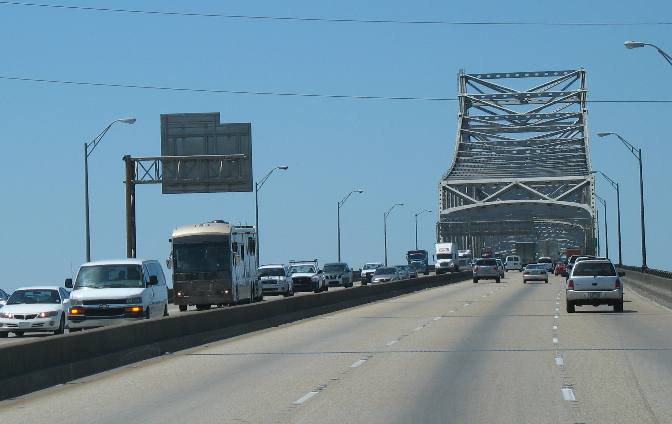
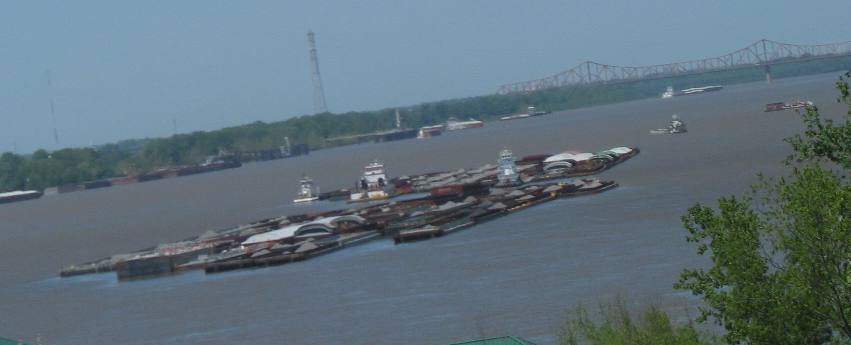
This
is a picture taken from the I-10 bridge over the Mississippi River looking north.
The view from the top of this bridge is breathtaking.
This is the
view from that bridge looking north, as in up-river. Barge traffic on the Mississippi
is hectic as usual. The bridge in the background is the ancient US-90 bridge that
crosses the River a few miles north of Baton Rouge. Ocean going vessels do NOT
go upriver past that bridge. If you are in an RV or pulling an RV that bridge
(the US-90 bridge) is very narrow and is not one you would relish driving a big
RV across unless you are looking for an adrenaline rush. Can you imagine narrow?
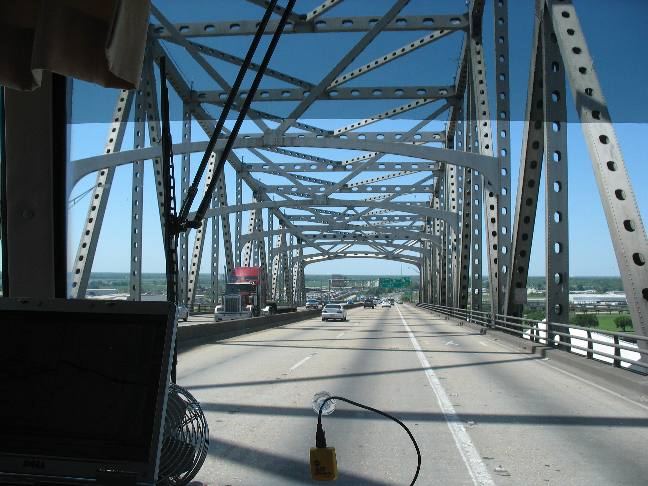
The
bridge looking at the west bank as taken through our motorhome windshield. In
contrast to the US-90 bridge this modern monster has nice wide lanes.
About
15-miles west of the Mississippi River Bridge is the equally impressive Atchafalaya
Basin Bridge. While the I-10 Mississippi River Bridge is huge in terms of size
(6-lanes) plus it reaches for the heavens in order to allow ocean going ships
to pass underneath the Atchafalaya River Bridge is equally impressive in length
and the engineering feat that was required to construct this 20-mile bridge across
America's most daunting swamp.
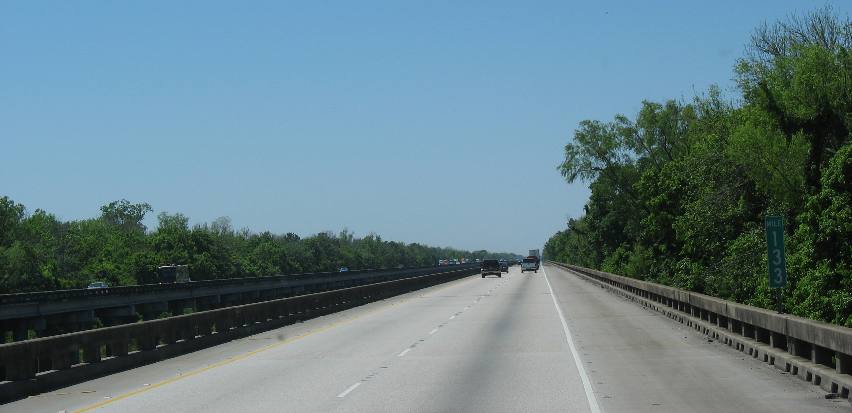
The
Atchafalaya Basin is the traditional flood plain of the Mississippi River and
still functions as such in times of high water, usually associated with traditional
spring runoff and flooding.
Before being "controlled" by the
Corps of Engineers two-thirds of the mighty Mississippi used to flow to the Gulf
of Mexico through the Atchafalaya Basin. Now huge levies hold back the Mississippi
River and direct two-thirds of the flow through Baton Rouge and New Orleans. In
times of high water more gates are opened to allow excess flow from the Mississippi
River into the Atchafalaya Basin. As you can see from this picture of the Atchafalaya
Basin Bridge, near the eastern side, the bridge is constructed as an east bound
and west bound highway. What makes the Atchafalaya Bridge different from most
is the bridge is traveling along in tree tops along much of its 20-mile length.
In
order to construct this portion of the bridge a canal was first constructed between
what is now the two bridges that allowed barges with cranes to operate. Wheeled
vehicles would sink out of sight in the mud. Also this canal provided a transportation
link to move construction materials.
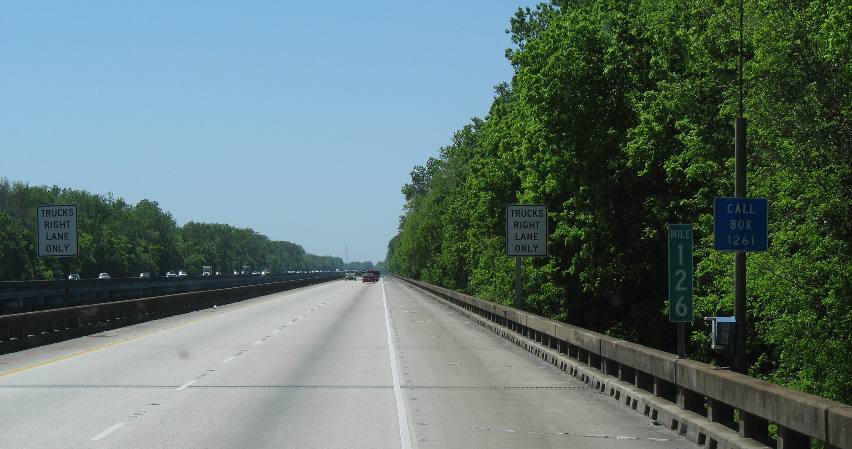
Remember
this bridge is 20-miles long. It doesn't take long before you begin to comprehend
the tremendous engineering feat required to overcome this terrain.
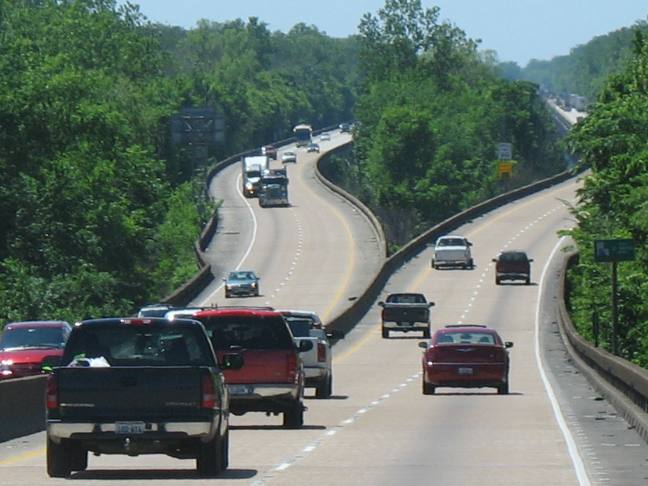
Several
navigable rivers flow through the Atchafalaya Basin. The east and west bridges
merge when crossing these rivers. We are descending from one of those bridges
in this picture. These bridges are constructed high enough so that barge traffic
and the tow boats that push them can pass underneath.
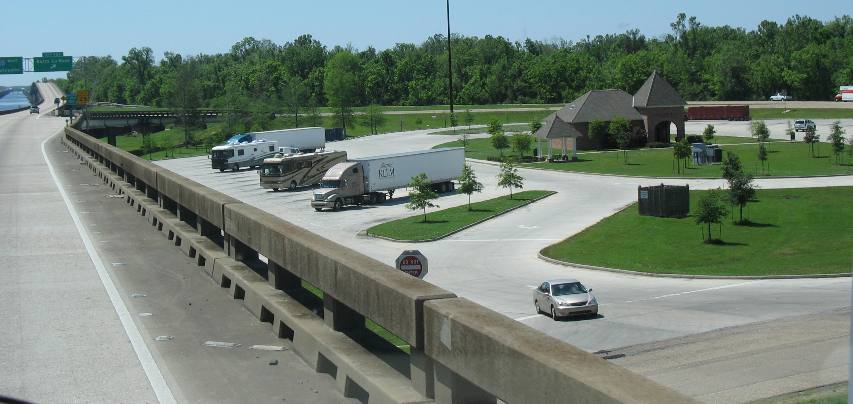
Somewhere
near halfway across the Atchafalaya Basin the bridge crosses a small island that
supports a Louisiana visitor center and rest area. As you can see there is parking
for RV's.
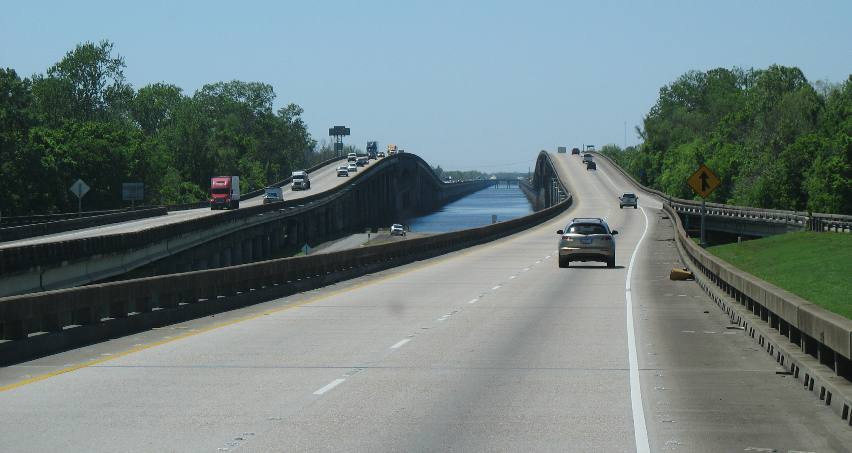
View
from the island that houses the Louisiana visitor center and rest stop looking
west.
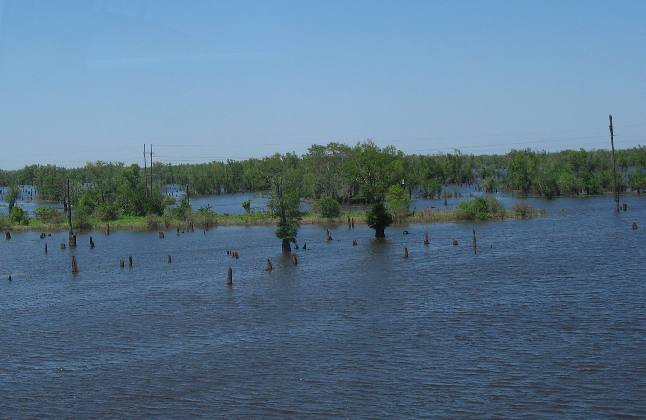
Western
portion of the Atchafalaya Basin as seen from the I-10 bridge.
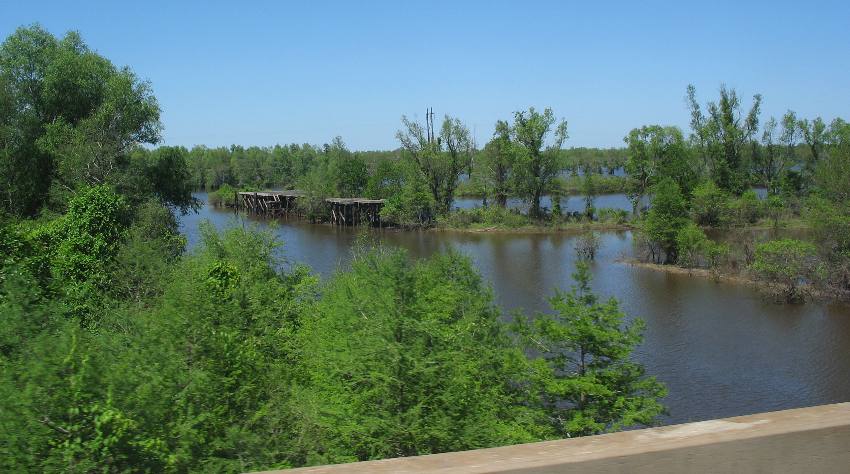
Typical
scene from the western end of the Atchafalaya Basin as viewed from the I-10 bridge.
Once
on the western end of the Atchafalaya Basin we are getting near our destination.
We were both dreaming about real Cajun food and one of our favorite feeding holes
is at exit-115. Needless to say we pulled off and got diesel fuel as well as stopping
at the Boudin Shack. The Boudin Shack is located on the northwest quadrant of
exit-115. While not exactly a shack it ain't a 5-star palace either. It is more
along the lines of a "locals" place where Cajuns from near and far arrive
to sample the victuals. I sampled the crawfish etouffee, fried crawfish balls
and potato salid while Joyce sampled the boudin balls and red-beans with rice.
Ahh, we are truly in Cajun Country. Life don't get much better than this.
Back
on I-10 we continued west to exit-104 in Lafayette where we exit onto Lafayette
street and head about 1/2-mile south to Alexander and turn east to Acadiana City
Park and Campground $13 for 50-amps and water. Can you say welcome to Lafayette
any better than that? To boot the park is situated in a setting of huge oak trees
that provide much appreciated shade during the summer months.
After getting
set up at Acadiana City Park we jumped in our Saturn and headed to the Nature
Conservancy heron rookery on the south end of Lake Martin hoping to enjoy one
of the countries largest heron rookeries. Although herons were there and nesting
they were not as visible from the viewing road as they have been in the past.
It seems they are roosting further back in the swamp. We can see activity several
hundred yards back in the swamp but we are used to the nest being within 100-feet
of the viewing road. The alligators that are usually abundant under the canopy
of nests have moved to where the activity/opportunity is and are not to be seen
as well. Oh well, we settled for viewing the plant life which we enjoy as well.
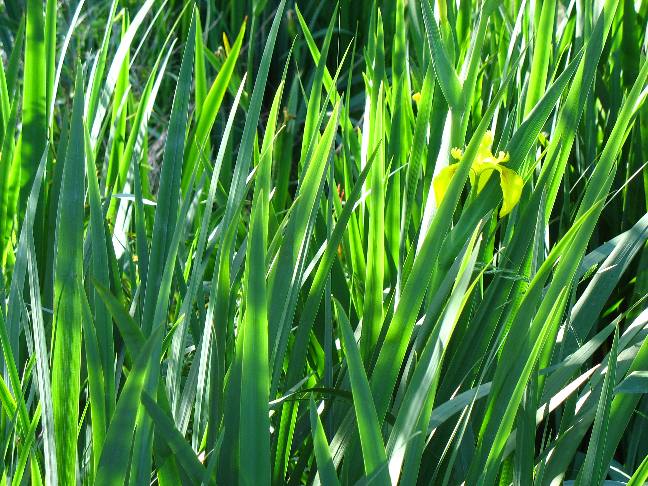
Yellow
iris can be seen growing wild throughout south Louisiana this time of year.
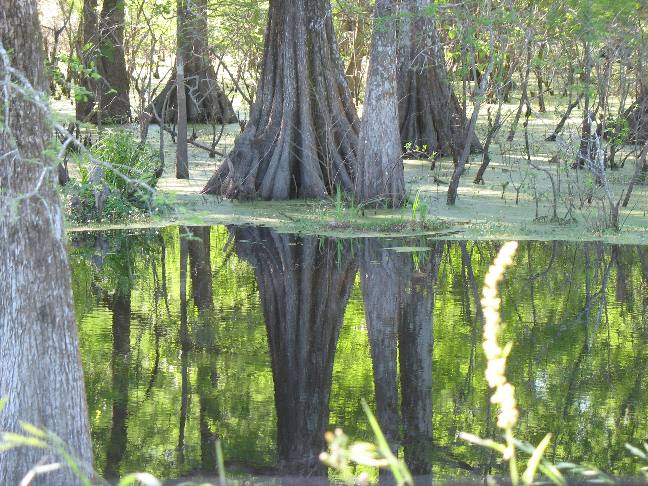
Massive
cypress trees reflecting in afternoon light.
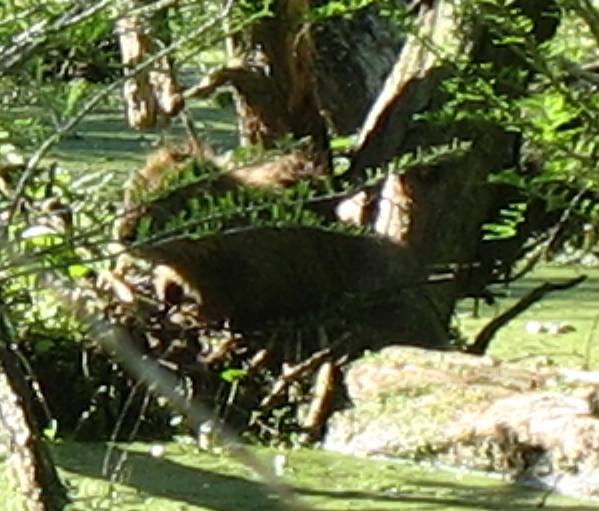
Nutria
the rodent imported from South America that has invaded Louisiana. Nutria pelts
became popular when beaver were hunted almost to extinction in North America.
Now there is a bounty on nutria and trappers are paid to rid the waterways of
these pest.
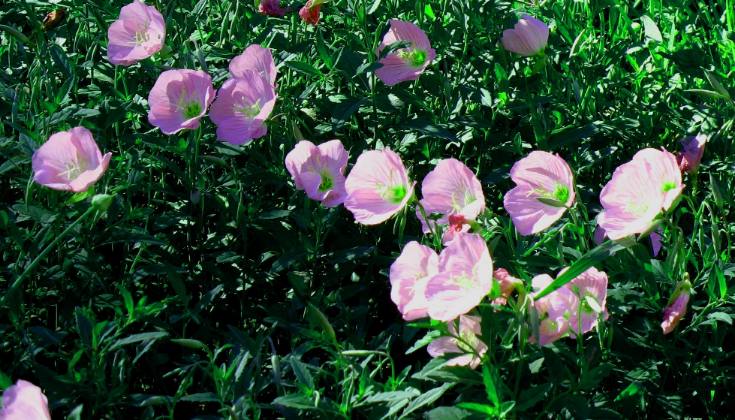
Evening
primrose in bloom along many of the highway rights of way.
Joyce
decided that I was going to take her dancing tonight and Randall's in Lafayette
was going to be the place for both dinner and dancing. Needless to say we had
a good time. Randalls is our pick of places to dine and dance when in the area
for a weekday night. Mulatte's in Beaux Bridge is OK but the food is just so-so
to be kind. The food at Randalls is much better as is the band and the dance floor.
The food at Prejeans is very good but the dance floor is almost non-existant and
the music doesn't start until after 9PM.
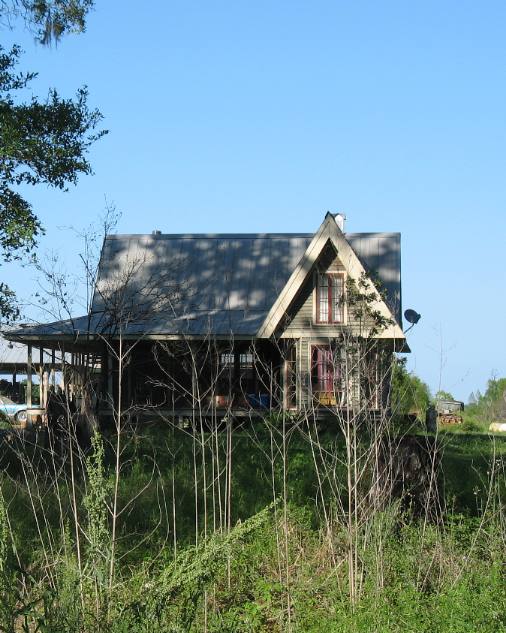
Cajun
home on the prairie south of Beaux Bridge, Louisiana.
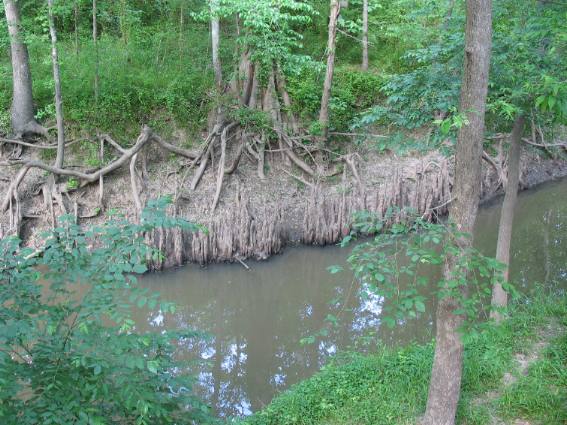
Coulees
are small streams, gullies or ravines. In southern Louisiana where there is very
little change in elevation these coulees do not have noticeable water-flow. Now
contrast that with the water-flow at Grand Coulee Dam. It does have noticeable
water-flow --- but you will note that the "Grand Coulee Dam" is NOT
in south Louisiana and that sure enough is a "Grand Coulee" agreed.
The
odd looking pieces of wood protruding from the waterline on the far bank are cypress
knees.
Saturday morning arrived and Joyce was up with the birds.
It was Saturday afterall and Saturday's in this neck of the woods meant a live
band playing zydeco music would be performing at Cafe Des Amis in Beaux Bridge.
They start at 8:30 and play till noon. Cajuns from miles around meet at Cafe Des
Amis every Saturday to expend energy on the dance floor. One thing is for sure,
no one is going to get any sleep if they are near zydeco music. The Cajuns describe
zydeco as "high-energy" Cajun music. High energy is right. Every zydeco
song is along the lines of "Proud-Mary" on steroids if you get my drift.
After
the band stopped playing we got a table and had lunch at Cafe Des Amis one of
our favorite dining places in Cajun Country. I sampled crawfish and sweet-corn
bisque and had some turtle soup. Both were to die for. Joyce opted for a chicken
dish. How can someone order a simple chicken dish when in Cajun Country? She made
up for that by splitting a white chocolate cream sauce bread pudding with me for
desert. Absolutely devine --- to die for good. Folks, if you are ever in this
area you just have to stop by Cafe Des Amis in downtown Beaux Bridge.
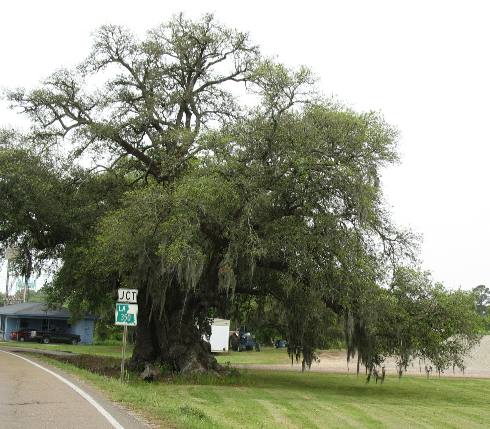
This
is an ancient and champion live oak tree in Parks, Louisiana 15-miles southeast
of Lafayette. It is the massive girth of this tree that makes it a champion. I
think they measure the trunks circumference about 3' from the ground. This tree
is hundreds of years old.
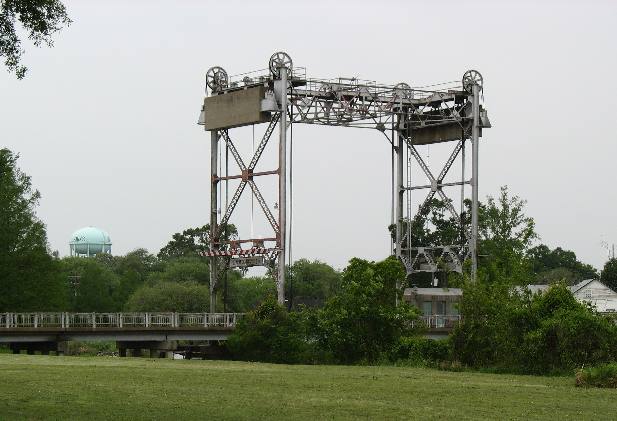
Joyce
took this picture of a bridge across Bayou Teche in Parks, Louisiana. Obviously
this is an OLD bridge. Note the massive concrete counterweights dangling at the
top.
Saturday night we headed
to the Atchafalaya Club for a night of dancing. The Atchafalaya Club is located
near Henderson, Louisiana. To get there from Henderson head east on the road leading
to the levee. The Atchafalaya Club is located on the corner at the levee. Don's
Restaurant is located there as well. The Atchafalaya Club is located on the far
end of Pat's Restaurant complex so turn in at Don's and drive to the far end of
the parking lot. The Atchafalaya Club was made to hold party crowds. The place
has a huge dance floor able to hold several hundred couples. An absolutely great
band was there playing 60's music. The band was one of those right out of the
60's complete with a brass section (trumpet, sax and trombone). The band didn't
take a break the entire 3-hours we were there. We left and went home out of sheer
exaustion.
We could stay here for months but our destination beckons and
we know the price of dillydallying. We have to move on tomorrow.
Until next
time remember how good life is.
Mike & Joyce Hendrix